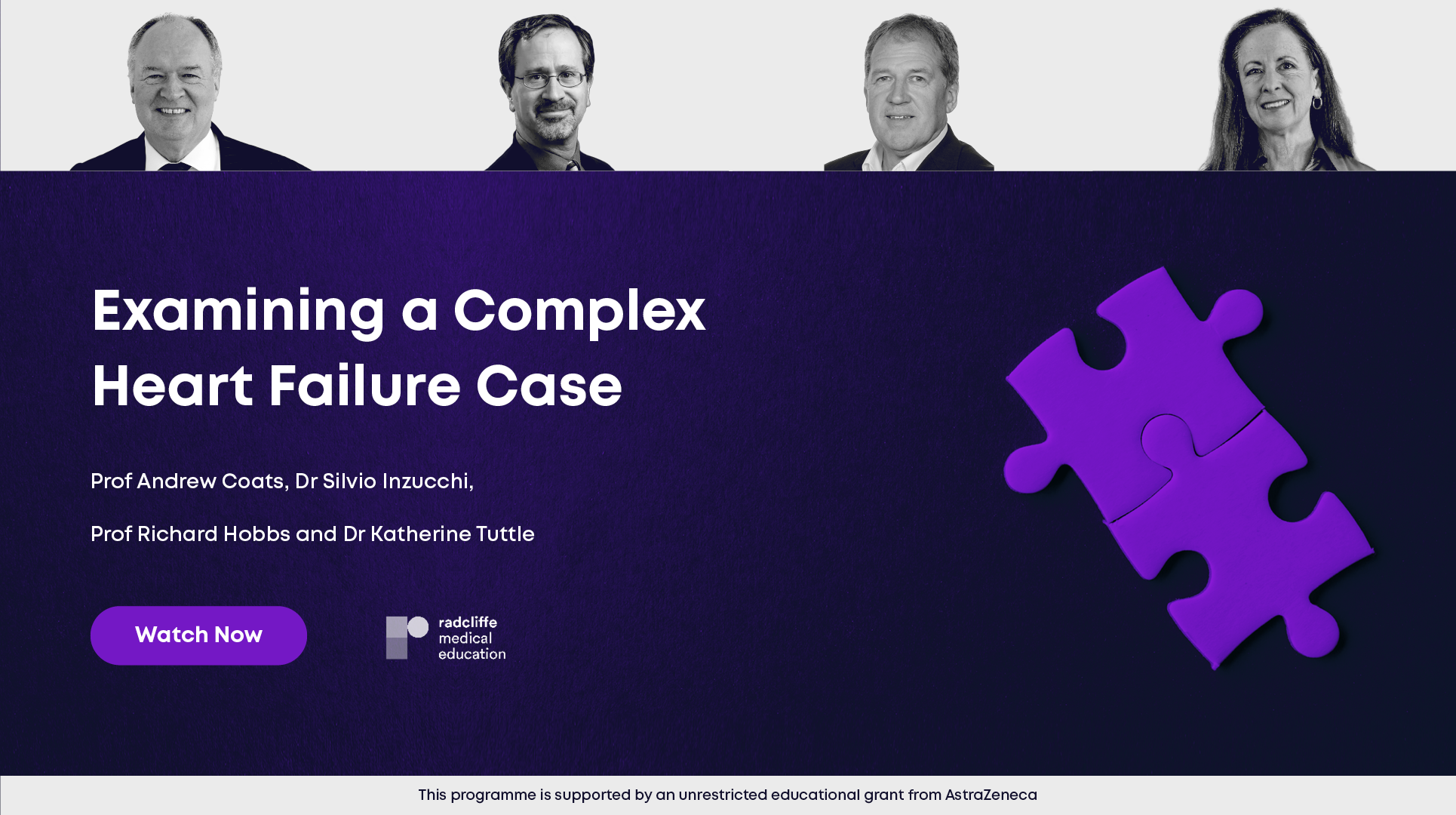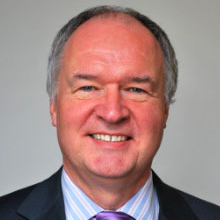Examining a Complex Heart Failure Case
Published: 25 February 2023
-
Views:
 12625
12625
-
Likes:
 7
7
-
Views:
 12625
12625
-
Likes:
 7
7
-
 2m 20sPart 1 Closing the Case: Re-cap and Summary Andrew JS Coats, Silvio Inzucchi, Richard Hobbs, Katherine Tuttle
2m 20sPart 1 Closing the Case: Re-cap and Summary Andrew JS Coats, Silvio Inzucchi, Richard Hobbs, Katherine Tuttle
-
 5m 2sPart 2 Opening our Case: The HFpEF Patient Andrew JS Coats, Silvio Inzucchi, Katherine Tuttle, Richard Hobbs
5m 2sPart 2 Opening our Case: The HFpEF Patient Andrew JS Coats, Silvio Inzucchi, Katherine Tuttle, Richard Hobbs
-
 10m 32sPart 3 Approaching the Patient: Shared Management & Decision Making Andrew JS Coats, Silvio Inzucchi, Richard Hobbs, Katherine Tuttle
10m 32sPart 3 Approaching the Patient: Shared Management & Decision Making Andrew JS Coats, Silvio Inzucchi, Richard Hobbs, Katherine Tuttle
-
 13m 18sPart 4 Diagnosing the Patient: Investigation & Initial Management Steps Andrew JS Coats, Silvio Inzucchi, Richard Hobbs, Katherine Tuttle
13m 18sPart 4 Diagnosing the Patient: Investigation & Initial Management Steps Andrew JS Coats, Silvio Inzucchi, Richard Hobbs, Katherine Tuttle
Overview
Moderated by Prof Andrew JS Coats, this broadcast explores how a complex heart failure patient would be treated by a multidisciplinary team. In this unique discussion, we examine how the broader heart failure team can work together effectively and consider best practices for referral and initiation of foundational medical therapy.
Learning Objectives
- Identify individuals likely to have HFpEF from initial presentation
- Refer suspected individuals for specialist assessment
- Initiate GDMT for HF as soon as patients are stable
- Initiate GDMT in HF regardless of EF and phenotype
- Initiate shared decision-making on complex HF patients with other members of the multidisciplinary team including cardiologists, GPs, nephrologists and diabetologists
Target Audience
- Cardiologists
- Heart Failure Specialists
- Primary Care Physicians
- Nurses
- Pharmacists
- HCPs
More from this programme
Part 1
Re-cap and Summary
Prof Coats closes this programme by summarising key learning points from this complex case of HFpEF.
Part 2
Opening our Case
Starting this series of videos, Prof Coats introduces the faculty, the programme agenda and presents our complex patient case study.
| 1 session | |
| Opening our Case: The HFpEF Patient | Watch now |
Part 3
Approaching the Patient
Here the faculty discuss their initial approach to this patient from the perspective of their different backgrounds and how they can most effectively manage this patient as a team.
Part 4
Diagnosing the Patient
The faculty discuss labelling the patient with a diagnosis, prioritising problems for management and ask who should start foundational therapy of SGLT-2 inhibitors.
Part 5
Managing the Patient
The faculty review poll results from the audience on approach to management, discuss their approach to initiating GDMT and explore overcoming a dip in renal function following SGLT-2 inhibition.
Part 6
Follow-up & Referral
The faculty now discuss the ongoing patient centred care required for this patient, continued investigation and holistic co-management.
Part 7
Responding to a Changing Patient
Here the faculty discuss how they would continue to manage the patient with foundational therapy as their symptoms, disease severity and comorbidities change over time. Further audience questions are answered, exploring trail data, initiation and real world use of SGLT-2 inhibitors.
About the episode
The faculty review poll results from the audience on approach to management, discuss their approach to initiating GDMT and explore overcoming a dip in renal function following SGLT-2 inhibition.
Faculty Biographies

Andrew JS Coats
Professor of Cardiology and Scientific Director
Prof Coats is Editor-in-Chief of the Cardiac Failure Review journal. He has published over 20 patents, more than 750 full research papers and more than 120,000 career citations and has a personal H-index of 146. Andrew was elected to the Presidential Trio of the Heart Failure Association of the ESC in 2018 and will serve as its president from 2020-2022.
Prof Coats is the Immediate past-President of the Heart Failure Association and past-Professor of Cardiology at the University of Warwick, UK. He has also held posts as Head of Cardiology at Imperial College, London and Associate Medical Director and Director of Cardiology at the Royal Brompton and Harefield Hospitals, London. From 2012 to 2017 he was Director of the Monash-Warwick Alliance, and before that served as Deputy Vice-Chancellor and Dean of Medicine at the University of Sydney.
He is an…

Silvio Inzucchi
Professor of Medicine
Dr Silvio Inzucchi is a Professor of Medicine at the Yale University School of Medicine in New Haven, where he serves as Clinical Chief of the Section of Endocrinology, Medical Director of the Yale Diabetes Center, and Program Director of the Endocrinology & Metabolism Fellowship.
Dr Inzucchi has been an invited lecturer both nationally and internationally on many topics, most pertaining to clinical diabetes management. He has authored or co-authored more than 500 manuscripts, chapters, monographs, and abstracts, some published in the most prestigious medical journals, including the New England Journal of Medicine and JAMA.

Richard Hobbs
Professor and Head of Primary Care Health Services
Richard Hobbs is Professor and Head of Primary Care Health Sciences at the University of Oxford, UK. He is Co-Director of the Quality and Outcomes Review Panel and Deputy Director of the National Institute for Health Research National School for Primary Care Research.
Professor Hobbs serves on numerous scientific boards and is chair of the European Society of Cardiology (ESC) Council of Primary Care, as well as the Prevention and Care Board of the British Heart Foundation (BHF). His publications include 25 book chapters, nine edited books and more than 250 original papers in peer-reviewed journals.

Katherine Tuttle
Executive Director of Research
Dr Katherine R Tuttle, is Professor of Medicine in the Nephrology Division and Kidney Research Institute at the University of Washington, US. Executive Director for Research at Providence Inland Northwest Health, and a Co-Principal Investigator for the ITHS. Her major research interests are in the areas of clinical and translational science and precision medicine for diabetic kidney disease, chronic kidney disease, diabetes, and hypertension. Dr Tuttle has led a major patient registry as well as clinical trials in these fields that have delivered breakthrough therapies to prevent kidney failure and cardiovascular events.





